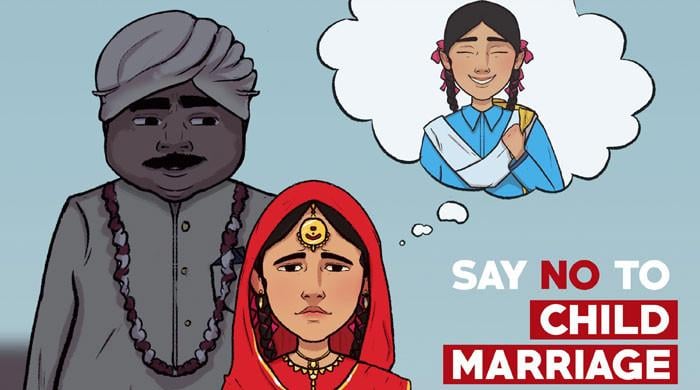
April 26, 2022
KARACHI: This week, Dua Zehra and Nimra Kazmi, both 14-year-olds, went missing from Karachi, Sindh. Following a massive outrage on social media, the police traced the two girls; however, they rejected claims of being kidnapped saying that they ran away to get married of their own freewill.
Both cases set off a firestorm of outrage among the public.
On Monday, in separate videos, the girls claimed that they had willingly left their house and were not under any pressure.
Read more: An unspoken abuse — time to end female genital mutilation in Pakistan
While it is unclear if their marriage was forced or not, another fact is that both girls were, reportedly, minors. Technically, it is illegal in Pakistan to marry before the age of 16. Yet, child marriages are prevalent in the country.
According to UNICEF, marriage before the age of 18 is a “fundamental violation of human rights.” Sindh is the only province in Pakistan, which has updated a law passed in 1929 and banned marriages before the age of 18.
In 2014, the Sindh Assembly unanimously adopted the Sindh Child Marriage Restraint Act, which raised the legal minimum age of marriage for boys and girls to 18 years. It further made the act a punishable offence. A man, above 18 years, who contracts a child marriage, could now be imprisoned for three years. Men who solemnised an underage marriage can also be locked up for two to three years. Even the parents or guardians, who authorised the marriage, can be prosecuted for failing to prevent it.
In 2015, Punjab amended the Child Marriage Restraint Ordinance 1971 and passed the Punjab Marriage Restraint Act 2015. It increased the imprisonment and fines but kept the legal age of marriage at 16 years.
In 2016, the Khyber Pakhtunkhwa assembly failed to pass Khyber Pakhtunkhwa Child Marriage Restraint Bill 2014, which would have raised the age of marriage to 18 years.
Balochistan also continues to be governed by the Child Marriage Restraint Act 1929.
In 2017, Senator Sehar Kamran moved a bill in the national assembly to increase the minimum age for girls to marry from 16 years to 18 years. However, a standing committee, headed by PPP’s Rehman Malik, struck down the bill and said it was contrary to Islamic injunctions. The bill was then referred to the Council of Islamic Ideology, where it is still pending.
In 2018, the chairman of the CII announced that a nikah can be performed at any age but the rukhsati can only take place after the age of 18.
Pakistan ratified the Convention on the Rights of the Child in 1990, according to which the minimum age of marriage is 18 years.